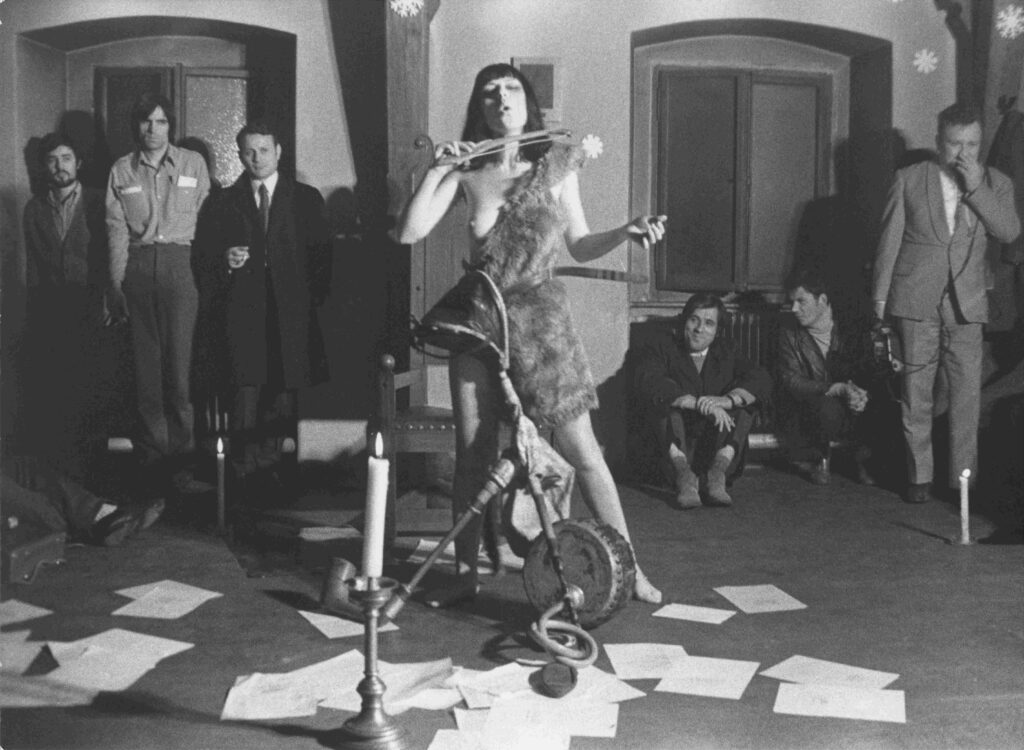international Archives day 2025
The Secondary Archive Platform
at 5.30 pm

Katalin Ladik, Shaman Poem, performance at GEFF Genre Experimental Film Festival, Zagreb, 1970. Courtesy of the artist and acb Gallery, Budapest.
International Archives Day 2025
The Secondary Archive Project
A conversation by the curators of the Kosovo, Poland and Hungary Sections of the Archive
Monday 9 June at 5:30 pm
Studio Tommaseo (via del Monte 2/1, Trieste)
Programme.
5:30 pm – Introduction by Adrianna Wiktoria Kowalik and Giuliana Carbi Jesurun
5:40 pm – Róna Kopeczky. Image as sound and body as voice in Katalin Ladik’s practice.
6:10 pm – Erëmirë Krasniqi. Redressing Absences—The Legacy of Women Artists in Kosovo’s Art.
6:40 pm – Adrianna Wiktoria Kowalik. Natalia LL: The Political Body through Intimate Radicalism.
On Monday 9 June at 5:30 pm, on the occasion of the International Archives Day 2025, Trieste Contemporanea presents to the Italian public a libraryline meeting with some of the curators of the Secondary Archive platform, which from the Second World War narrate the history or three generations of women artists from non-Western European art (mainly from Central and Eastern Europe). Protagonists of the Trieste conversation will be Adrianna Wiktoria Kowalik, coordinator of the Archive, along with Róna Kopeczky and Erëmirë Krasniqi, curators of the Hungarian and Kosovo sections of the Archive (which are two of the many countries that make up it). The meeting is organised, in the framework of the 30th anniversary of Trieste Contemporanea Feelings of Togetherness, in collaboration with the Katarzyna Kozyra Foundation in Warsaw, which has promoted the essential work of the international team that, since the official opening of Secondary Archive at Manifesta 14 (2022), has been making the ‘secondary’ voices of female art public facts in contemporary European art.
The meeting will start with an introduction on the work of the Polish platform by its coordinator (and curator of the Polish section) Adrianna Wiktoria Kowalik. Then each of the three invited curators will focus on a range of important artists from their countries and continue highlighting the 70s’ activity by an artist they particularly appreciate which is presented in the Archive.
Róna Kopeczky, who takes care of the Hungarian section and contributions to the Secondary Archive project, will speak about Margit Szilvitzky (1931-2018), Ágnes Eperjesi (b. 1964), Zsófia Keresztes (b. 1985) and more in depth on the work by Katalin Ladik (1942-): a Hungarian poet, actress and performance artist, one of the most prominent representatives of experimental art in former Yugoslavia. Her artist practice transcends traditional media and operates with performative dynamics. With a soft feminist approach, it focuses on the topics of female energy, body, its image, intimacy, role stereotypes and transformative energies in order to deconstruct the rigid frame within which society expects women to evolve.
After her brief introduction on the Kosovo art scene and on artists Alije Vokshi, Violeta Xhaferi and Valbona Zherka, Secondary Archive curator Erëmirë Krasniqi will at her turn examine the figure of Alije Vokshi. Alije Vokshi. She graduated from the department of Figurative Arts at the High Pedagogical School in Prishtina. Her expressionist portraits of women and workers, placing an emphasis on their hands, were well received. Encouraged by her professors, and later her father, she went to study in the Academy of Fine Arts in Belgrade, Yugoslavia. By gaining admission in 1968, she became the first woman to study art and take up painting as a profession in Kosovo. In 1974, until her retirement in 2015, Vokshi taught painting at the Department of Graphic Design at the University of Prishtina, Kosovo. She died in Prishtina in 2022.
Finally, Adrianna Wiktoria Kowalik will briefly analyse the work of the Polish women artists Alina Szapocznikow, Maria Pinińska-Bereś, Izabella Gustowska and Natalia LL. On the latter one she will go more in depth: Natalia LL was a pioneering Polish feminist artist known for her provocative body and performance art. Her iconic Consumer Art series challenged consumerism and the objectification of women. She co-founded the avant-garde PERMAFO Gallery and influenced generations of artists.
The Archive Sections presented in Trieste.
Hungarian Secondary Archive Section. In the frame of Easttopics, Róna Kopeczky takes care of the Hungarian section and the contributions to the Secondary Archive platform since 2020. The section presently counts 73 artist statements from the pioneering neo-avant-garde generation to young art academy graduates and elaborated by 14 curators, as well 2 essays from 2 art historians focusing on aspects relevant in Hungary.
Kosovar Secondary Archive Section. The archive of women artists’ statements in Kosovo reveals overlooked contributions and traces multiple artistic trajectories across generations. With their legacies largely understudied, bottom-up archives and non-traditional sources have become invaluable tools for reconstructing and reclaiming their narratives.
Polish Secondary Archive Section. The Polish section of the Secondary Archive includes 150 of 607 women artists, born from the 1930s to the 2000s, whose voices trace dictatorship, transition, and the shadows left in memory, revealing a shared past through radically individual forms.
The speakers.
Róna Kopeczky (b. 1983). She is a curator and art historian based in Budapest. Between 2006 and 2015 she was curator at Ludwig Museum in Budapest, and since 2015, she acts as the artistic director of acb Gallery in Budapest. She is the co-founder and -director of the Easttopics platform, dedicated to representing the Central and Eastern European contemporary art scene.
Adrianna Wiktoria Kowalik. She holds a Master’s degree with honors in Contemporary Art from Ca’ Foscari University of Venice, specializing in critical art from Poland, Ukraine, Belarus, and Russia since the 1950s. She has collaborated with the digital platform Cifra. She currently coordinates and leads curation at the Secondary Archive.
Erëmirë Krasniqi. She is an art writer, researcher, and curator from Prishtina, Kosovo. Her writing has appeared in «Artforum», «springerin», and «frieze», among others. She curated the Pavilion of the Republic of Kosovo at the 60th International Art Exhibition La Biennale di Venezia, which received a Special Mention for National Participation, and is currently a Curatorial Fellow at Hamburger Bahnhof, Berlin, Germany.
